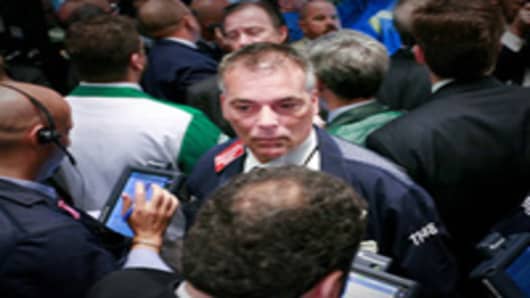Another volcanic ash cloud threatening European airspace, a threat to downgrade Belgium's credit rating and Moody's warning that it could cut UK banks' credit ratings did not make for pretty reading for investors Tuesday.
But the news, while bad, was not a disaster according to market analysts, and shares advanced in morning trade.
In fact, the long term view of the European markets remains reasonably positive with more concern aimed at whether the US economy has recuperated enough to help drive the global economic recovery and China’s continuing inflation battle.
“Tactically there’s a lot of nervousness out there but we are more convinced that people should invest in the market because it’s too cheap,” Karen Olmey, head of thematic strategy at UBS, told CNBC.com.
Laurent Fransolet managing director and head of European fixed income, said in a research note on Tuesday that while European markets were likely to remain jittery following the volatile sessions on Friday and Monday, “overall, despite…..potential headline risks, we expect markets to be a bit less volatile in both peripherals and outright levels.”
This is despite a range of factors that can only have helped to add to the volatility of the markets not least of which will have been the actions of the ratings agencies on Tuesday morning.
Fitch Ratings threatened Belgium with a downgrade of its credit rating, repeating its warnings from over six months ago that a lack of stable government threatened its plans for a credible debt reduction programme.
Moody’s announced that it was reviewing the credit ratings of 14 UK bankssuggesting they could be downgraded on the basis of their ability to deal with their debt and the UK taxpayer’s willingness to provide continued support.
Notable among the banks on the list were Lloyds Banking Group,Royal Bank of Scotland, Nationwide, Santander and Bank of Ireland, the banks with the greatest exposure to European debt.
All Eyes on Fed Policy
Economic data out of the UK showed that in April 2011, government net borrowing stood at 10 billion pounds compared with 7.3 billion pounds in April 2010.
In contrast Germany’s IFO business climate index, based on a monthly survey of some 7,000 firms, remained unchanged at 114.2 in May from a reweighted 114.2 in April, suggesting the German economic recovery continues apace and surprising some analysts.
Yet Olmey told CNBC.com the main reasons for investor nervousness were more to do with “people starting to fast forward to the end of the second round of quantitative easing (QE2) leading to a strengthening dollar”.
Overall, Olmey said, the big questions for investors were the rate of Chinese inflation and whether the US economy can stand on its own following the end of QE2.
“It’s almost like the game is up. There’s limited support to keep things going from central banks. What we have left is keeping rates low which can’t continue forever,” she said.
“It looks like the US economy has good foundations but we have to watch the non farm payroll figures for July," she added.
For Europe, Growth is Key
“The sovereign debt story rattles on a bit but unless Spain falls apart then I don’t think it’s a concern. The core is still growing decently but again there is nervousness there,“ Olmey said.
Justin Urquhart Stewart, founder and co director of Severn Investment Management was more critical about investor nerves.
“People are getting themselves into a tizzy over nothing and they were thrashing [on Monday] around trying to pin the blame on something. We seem to be having a bit of an early summer frenzy,” he said.
News of more concerns over the euro zone, China slowing down and commodity price concerns told investors “nothing new,” said Stewart, adding markets could easily be pushed into far more positive territory on the back of a good news story.
“The bigger concern is about what happens when QE2 comes to an end in the US next month and whether we get QE light. But the Fed will keep the US economy going until after the elections next year,” he added.
Meanwhile, Urquhart Stewart warned, if the Chinese economy slowed down significantly the impact on commodities could be equally significant and with 36 percent of the FTSE 100 now occupied by oil and mining companies more volatility was to be expected and may even become the norm.
“The second half of the year is going to be characterized by lower and slower growth. I know the bulls would have it the other way but I just don’t see where it comes from. It will be lower and slower growth but it will still be growth,” he added.


